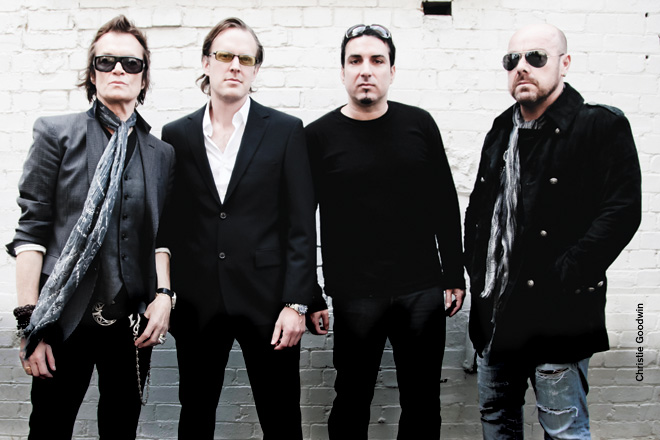BLACK COUNTRY COMMUNION
Luminaries from the rock world find their own chemistry together
Black Country Communion’s latest record, Afterglow, wasn’t even out when reports began flying that tension between singer and bassist Glenn Hughes and guitarist Joe Bonamassa could mean the end of the hard-rock supergroup. But in no time the dustup was quelled. “We’re really good friends,” Hughes says. “It was just a small blip there for a moment, but we’re all back on track, and long may it continue.”
The album is the third that Hughes and Bonamassa have recorded with drummer Jason Bonham and keyboardist Derek Sherinian. It’s full of relentless riffs on songs showcasing sinewy, powerful vocals from Hughes, who fronted Deep Purple in the ’70s and sang with Tony Iommi in the ’80s, and has maintained a prolific solo career for decades. In fact, after releasing BCC albums in 2010 and 2011, Hughes intended Afterglow to be a solo release. “I thought after doing two albums it would be best for me to do another project,” Hughes says. “I haven’t made a record in five years on my own, so I started to write what was going to be a Glenn album.”
Instead, producer Kevin Shirley convinced Hughes to make a BCC album, along with a live DVD. “It’s pretty crazy,” says Hughes. “At this point in my life, I thought I’d slow down a bit. I’m not really great at multitasking, so I ended up concentrating on this band and fell in love with it.”
The group came together in 2009 after Hughes and Bonamassa jammed onstage at the NAMM music trade show in California, then recruited Bonham and Sherinian. Together, they comprised a band dedicated to a hard-rock sound that wasn’t exactly in vogue at the time. “It wasn’t like we were following a trend,” says Hughes, who had released the soul-funk album First Underground Nuclear Kitchen the year before BCC formed. “I had a dream about six months before we started making the first album that I would be making rock music again.”
The musicians have translated their respect for one another’s work into a collaborative chemistry that allows them to work especially fast in the studio. “Joe calls it the comet,” says Hughes, who wrote the bulk of the tunes. “We go over the song and then we cut it. There’s no rehearsing, no preproduction.”
Whether the members of Black Country Communion can find time to tour in 2013 is a secondary consideration, according to Hughes. The first is a bond that is “like family,” he says. “Deep down inside, it really is about music. That’s what brought us together.”
–Eric R. Danton




comment closed